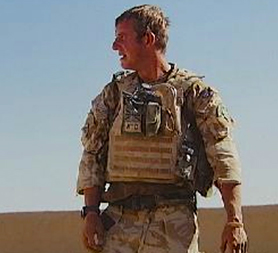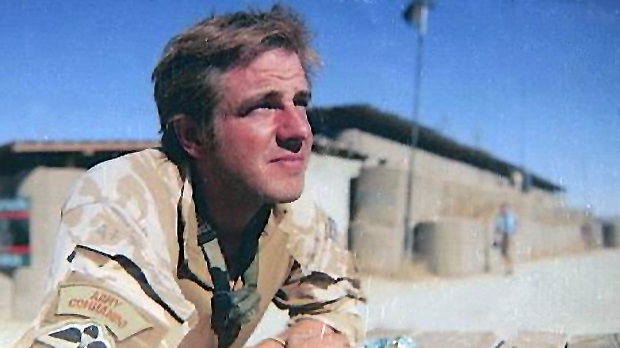Olaf Schmid: did ‘tiredness’ kill Afghanistan bomb expert?
Exclusive: The army’s top bomb disposal expert Olaf Schmid may have been suffering “cumulative tiredness” when he was killed by an IED, according to restricted documents seen by Channel 4 News.
It happened when the army faced “problems” with a shortage of bomb disposal operators and, as the documents reveal, at a time when guidelines for troops’ rest and recuperation breaks were being “breached”.
Christina Schmid, the widow of Staff Sergeant Schmid, posthumously awarded the George Cross for his bravery, has always said overwork and fatigue may have played a part in her husband’s death – something the Ministry of Defence has denied.
Mrs Schmid is infuriated at the way defence chiefs have handled his case, causing her to walk out of the inquest into his death on the first day.
I just feel that they were quite happy to discredit him…. it was blamed on the operator, or the device, or he was unlucky, or whatever. Christina Schmid
She told Channel 4 News: “I just feel that they were quite happy to discredit him.
“I do feel that the chain of command were quite happy and clearly quids in that, you know, it was blamed on the operator, or the device, or he was unlucky, or whatever. Whereas actually you can’t say that because he clearly hadn’t been looked after as well as he could have been and the guidelines were flouted and they were overworked and undermanned”.
An MoD spokesman has told Channel 4 News: “SSgt Schmid was considered by his chain of command to be fit for duty. The IED threat increased in 2009 and this put pressure on tour breaks for counter-IED operators, but SSgt Schmid was about to take his break entitlement.”
Read more from Channel 4 News – IEDs: the invisible enemy
Channel 4 News has seen a copy of a Ministry of Defence document marked: “Restricted staff – not for release” prepared just one week before the inquest.
The 32-page briefing sets out in detail a press strategy for the case with information on what to say to the media “if pressed” for answers. It confirms the army was experiencing problems with the number of bomb disposal men in Afghanistan at the time.
Olaf “Oz” Schmid was on day 129 of his tour-of-duty having defused 64 devices in that time. He was due to go on leave the following day. He had already dealt with two bombs the day he was killed.
The report questions: “How many Explosive Ordnance Disposal (EOD) operators do we have, in total and deployed in Afghanistan? Do we have enough EOD operators?”
“We have sufficient to match the current threat.”
We were at less than 50 per cent training staff for new operators and had drained the existing pool of manpower. Senior army source
“If pressed” it suggests the following answer: “At the time of Staff Sergeant Schmid’s tour there were problems generating the size of pool of advanced EOD operators required to obviate the need for individuals to return for a second tour. The problem was not that they were not available, but that they were in the training pipeline for later tours.”
Channel 4 News special report – Afghanistan: taking on the Taliban
This information was not revealed at the inquest.
In fact a very senior army source speaking on condition of anonymity has told Channel 4 News: “We were at less than 50 per cent training staff for new operators and had drained the existing pool of manpower.”
This is the kind of detail that makes Christina Schmid convinced that, as he entered his fifth month in Afghanistan clearing away dozens of improvised explosive devices, her husband was mentally exhausted and had shown signs of physical exhaustion some weeks before he was killed, when he collapsed on duty.
“He’d kind of been shouting and quite delirious and sort of in a sleep like state so it wasn’t just a simple fainting. They said it was down to dehydration and heat exhaustion.”

Now Channel 4 News can reveal that for the first time the MoD admits Olaf Schmid may have been suffering “cumulative tiredness” at the time he was killed.
The question of whether he was fatigued has been repeatedly raised by his widow and is answered honestly for the first time in the document.
It states: “There was no evidence of fatigue on the day; however, the issue of cumulative tiredness is a possibility.”
It’s that moment at which the drawbridge goes up behind you, the visor comes down and you make that long walk to the bomb on your own. That’s why they call it the lonely walk. Chris Hunter
‘One of the most mentally and physically demanding roles’
Bomb disposal is one of the most mentally and physically demanding roles in the army.
Former Explosive Ordnance Disposal operator Chris Hunter tells Channel 4 News what would have been going through Olaf Schmid’s mind that day: “It’s like a game of extreme chess when you leave the relative safety of your cordoned position.
“It’s that moment at which the drawbridge goes up behind you, the visor comes down and you make that long walk to the bomb on your own. That’s why they call it the lonely walk.
“He’s thinking about the bomb itself, the technical composition of the bomb – has he placed a device specifically to lure me in as an operator so he can kill me with a secondary or hidden tertiary device or so that I can be in the crosshairs of a sniper scope? There’s so many things go through your mind.”
Your browser does not support iframes. You could try and view the content directly

‘Tempo of operations was massively high’
Our documents also reveal that military harmony guidelines regulating soldiers’ tours of duty rest and recuperation periods were being regularly breached but insist this did not happen in Olaf Schmid’s case.
The briefing document asks: “Are the military covenant / Harmony guidelines being broken in respect of some trades?”
“The high operational tempo over the last few years has meant that a number of units have breached unit Harmony guidelines. Although we are doing our best to maximise tour intervals, unit Harmony cannot always be guaranteed.”
A very senior army source has told Channel 4 News the bomb disposal operators were working flat out at the time of Olaf Schmid’s death: “The tempo of operations was massively high.”
Christina Schmid insists the Harmony guidelines must be enforced: “That’s a matter for Liam Fox and Cameron isn’t it? They’re going to have to grapple with that. It’s completely unacceptable.”
The Taliban bomb-making capability had increased 400 per cent year-on-year and our source said: “The enemy was outbuilding and outlaying us. It was beyond our most pessimistic forecasts.”
In 2009 the kill-rate of Taliban IEDs was the highest of the war so far – three-quarters of all British soldiers killed that year were victims of IED bombs or mines. Eighty men in total killed as a result of IEDs or mines.
It is perhaps no wonder that Olaf Schmid’s team were in such high demand.
Our documents reveal the papers relating to a death should obviously be shared with the family well before any inquest. In the “Guidance for Service Dead Soldiers’ Families” document sent to widows it states: “A service inquiry is an internal inquiry. An inquiry may take many months to complete.When the inquiry is complete a declassified copy of the report will be available to the next of kin.”
In the case of Olaf Schmid the documents reveal the Special Investigation Branch report into his death was completed in March 2010 and sent to the coroner in May 2010. But despite the guidance Christina Schmid received the papers only the day before the inquest which began on 9 February 2011.
The inquest into Olaf Schmid’s death heard evidence that he had been killed by a “low metal content” improvised explosive device.
Channel 4 News has learned that equipment used to detect the special type of low-content metal bomb triggers which the inquest heard led to Olaf Schmid being killed was tested by the army just one week after his death and became available to operators just one month later.

Statement from the Ministry of Defence:
An MOD spokesman said: Our sympathies are with Staff Sergeant Olaf Schmid's family and friends. We recognise the bravery and commitment of Counter-IED (C-IED) Operators, who do an extremely tough and high risk job.
The threat from the insurgents in Afghanistan changes constantly and we have to adapt our tactics and equipment to meet that evolving threat. The MOD had the required number of C-IED Operators to meet the predicted IED threat in Afghanistan in 2009. Following an unprecedented increase in the threat from IEDs, the number of Counter-IED Teams has increased considerably over the past few years and there are sufficient teams to match the current threat.
The MOD does everything it can do to ensure bereaved families receive support and information following the death of a loved one. Visiting Officers stay in contact with families and, support is also provided throughout the independent inquest process.
The independent coroner decides which documents should be released prior to the inquest and what areas the inquest will cover.
In a further statement, an MoD spokesman has told Channel 4 News: SSgt Schmid was considered by his chain of command to be fit for duty. The IED threat increased in 2009 and this put pressure on tour breaks for counter-IED operators, but SSgt Schmid was about to take his break entitlement.
The MoD document rightly refers to SSgt Olaf Schmid as a selfless and courageous hero. It contains his full posthumous George Cross citation, plus tributes from those who worked alongside him. The document includes a Q and A to enable the MoD to give factual answers to the media's many and diverse questions.
Military covenant
Christina Schmid is now calling on the prime minister to enshrine in law the so-called Military Covenant governing the army’s duty of care guidelines for soldiers.
She said: “Maybe the military covenant should be legally binding. Maybe it’s come to that.”
It is the unanswered questions and the Ministry of Defence’s apparent reluctance to offer full disclosure which makes Christina Schmid determined to get an independent inquiry into her husband’s death.
“There’s something sinister going on here. I mean what’s going on? It’s like they’re all colluding to kind of sweep this under the carpet.”
What Christina Schmid wants to see happen as a result of her husband's death:
Harmony guidelines
The Army should rigorously enforce and keep to its "Harmony guidelines" on rest and recuperation for bomb disposal operators. Olaf Schmid should have had his rest period six weeks earlier.
Psychometric testing in theatre
Mrs Schmid contends that her husband was desensitised by his gruelling and relentless job. There should be psychometric testing on the job at fixed periods every six weeks as operators can become immune to the dangers they face.
Military Covenant
The prime minister should enshrine in law the armed forces duty of care guidelines known as the Military Covenant,
Independent inquiry
An independent inquiry carried out into the death of her Staff Sergeant Schmid and into other deaths relating to military specialist trades.